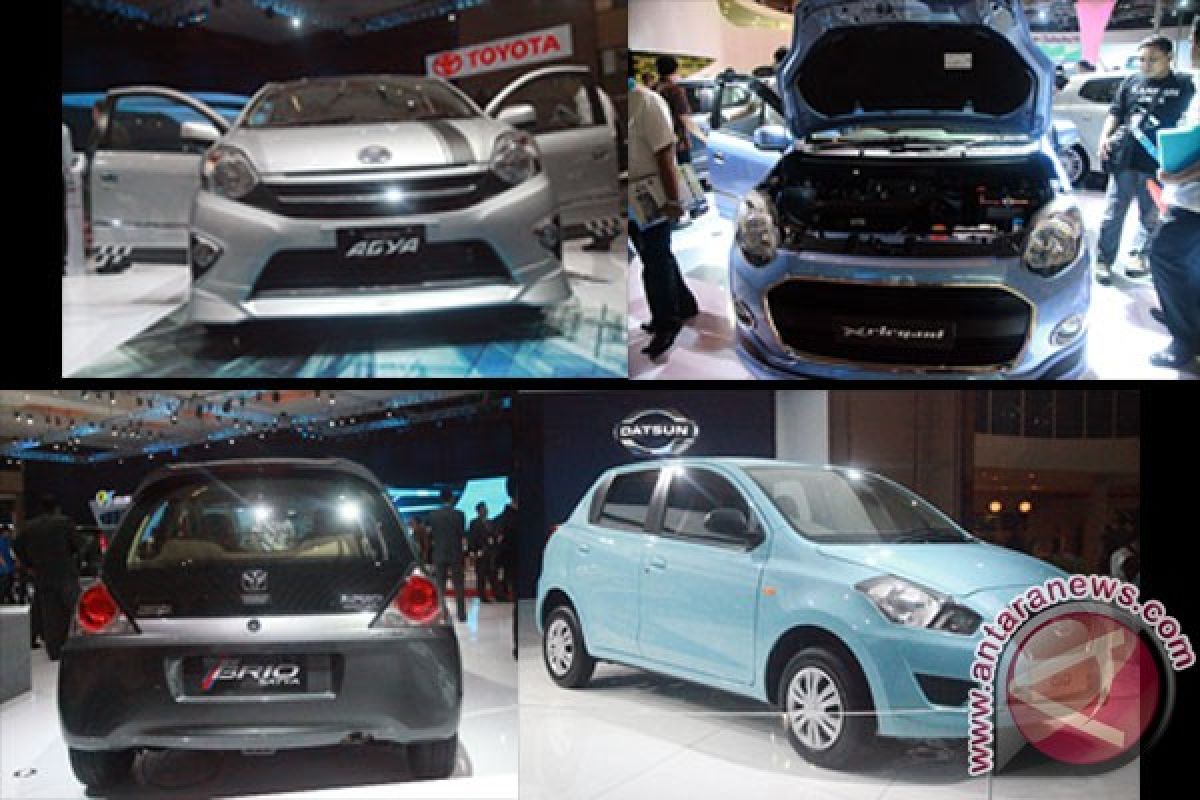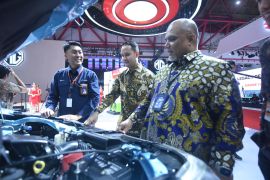Indonesia is en enormous market for auto sales as it has 33 provinces with a population of about 240 million people.
So if Jakarta is already considered to be a city `packed` with vehicles and terrible traffic jams, then new cars --which will be built based upon the government`s low-cost and green car (LCGC) program-- could be sold to customers in regions other than Jakarta.
Yet, there is no guarantee that Jakartans will not purchase green cars, which are expected to be sold at Rp95 million per unit.
Jakarta Governor Joko Widodo, popularly known as `Jokowi`, recently sent a letter to Vice President Boediono regarding the government`s LCGC policy, which he fears would worsen traffic problems in the city.
According to the vice president, the public must not be prohibited from buying inexpensive cars, but to curb purchases the government could provide cheap, comfortable, and safe public transport facilities and also issue regulations that would reduce the number of cars on the streets, such as the imposition of an electronic road pricing (ERP) system.
Boediono admitted that metropolitan cities in the country might be flooded with cheap cars after the policy is enacted, and this may worsen traffic congestion. However, he said the central government is ready to cooperate with regional governments to deal with such problems.
So, the manufacturing of inexpensive green cars must move ahead, as it will help boost the development of industries at home.
Further, the government is planning to make its LCGC cars into a main export product in the future, though analysts remain unsure of whether Indonesia could win over foreign markets for this car.
Chief Economic Minister Hatta Rajasa said Indonesia`s low-cost green cars could become the country`s main export commodity, in light of the opening of the region when the ASEAN Economic Community (AEC) officially begins in 2015.
"We would be grateful if Indonesia`s low-cost green cars could become the nation`s main export commodity. After all, Indonesia`s automotive sector has continued to grow. I hope the ministry of industry will develop the LCGC into Indonesia`s main export product," the minister said.
He noted that one of the goals of the Indonesian government, as the AEC begins in 2015, is to turn the country into a manufacturing base for certain products, such as automotive products and textiles, so that Indonesian products will be competitive in the free market.
"Indonesia can serve as a production base for automotive products, textiles, and others. If we are careless, companies in the automotive industry will go to Thailand. The products must be exported so that they do not flood the domestic market," he added.
However, analysts questioned Minister Hatta`s plan to export LCGC products, noting that Indonesia currently imports automobiles.
"Which countries are willing to import them? Aren`t we importing cars from Malaysia," Darmaningtyas, the director of the Transportation Study Institute (Instran), asked on Friday.
Darmaningtyas said the proposed low-cost production policy contradicted the government`s policies on reducing fuel oil consumption and easing traffic woes in big cities such as Jakarta, Surabaya (East Java) and Medan (North Sumatra).
"Because the low-cost green cars` price is low, a large number of people will surely buy them and, in this case, it will consume a lot of fuel. State-owned oil and gas firm PT Pertamina has expressed concern that with the launch of the cheap cars, subsidized fuels might be quickly used up. Who can control what occurs in the field so cheap cars will not use subsidized fuels?" Darmaningtyas asked.
Meanwhile, Energy and Mineral Resources Minister Jero Wacik said his ministry would propose that low-cost and green cars should be powered by natural gas. "These cars are manufactured under an environmental-friendly concept. I will propose that the cars should use gas fuel," Minister Jero Wacik said.
Referring to the objection of Jakarta Governor Jokowi, Jero said inexpensive cars could be sold to customers in other provinces. "I agree to the idea that cheap cars are designed for people in villages, they should not be sold in Jakarta," Jero added.
Besides consumers in other regions, low-cost cars could also be exported.
According to Chief Economic Minister Hatta Rajasa, Indonesia will be able to supply inexpensive green cars to other countries in the ASEAN region that require energy-efficient automobiles.
"A significant number of LCGC may be exported because there will be a huge demand for environmentally friendly cars in other countries," said the minister.
Additionally, the birth of inexpensive green cars is expected to fulfill the government`s dream of creating a national car, which will boost the development of automotive support industries and support the country`s emission reduction target of 26 percent before 2020.
"We are capable of becoming a base for the production of export commodities. This product may give rise to a national car, too. So, these cars are not only for export, since they will be able to assist in the development of supporting industries in the country. In addition, we have established an eco-friendly program to cut emissions by 26 percent before 2020," noted the coordinating minister for economic affairs.
The Indonesian government is now ready to implement the environmentally friendly vehicles system or introduce the low cost green car (LCGC) by inviting foreign automotive investors.
"Indonesia is ready to implement the LCGC system, and is expected to invite foreign investors to become involved in the green car scheme," said Budi Darmadi, the Director General of Technology-Based Industry at the Ministry of Industry.
Further, Industry Minister MS Hidayat was quoted by Tempo.Co online media as saying Indonesia has plans to begin exporting green cars in 2014. "I have discussed it with producers and they said they were ready," Minister Hidayat was quoted as saying.
He added that Indonesia would export the green autos to a number of neighboring countries, such as Thailand and Malaysia. Also, after the South East Asian region begins operating, the cars will be exported to other parts of the world.
"We have to think of competing with Thailand, which produced LCGC cars earlier than we have," Hidayat said.
In the meantime, PT Astra Daihatsu Motor is planning to export green cars to a number of Asian, African and Latin American countries. President Director of PT Astra Daihatsu Motor Sudirman Maman said his company has secured a license to export LCGC products.
"We are offering LCGC cars to several countries in Asia, Africa and Latin America," he said, adding that a number of countries had offered a positive response to the Indonesian plan to export inexpensive green cars.
Therefore, Astra Daihatsu is planning to increase its LCGC production capacity if demand increases. Sudirman said his company`s LCGC production in 2013 was still limited to 30 thousand units per month.
If exports are already meeting expectations in 2014, Astra Daihatsu will gradually raise its production capacity based upon demand, he said.
Reporter: Andi Abdussalam
Editor: Aditia Maruli Radja
Copyright © ANTARA 2013












